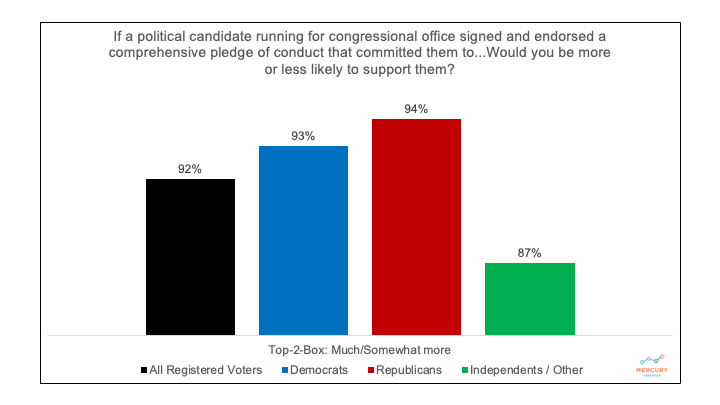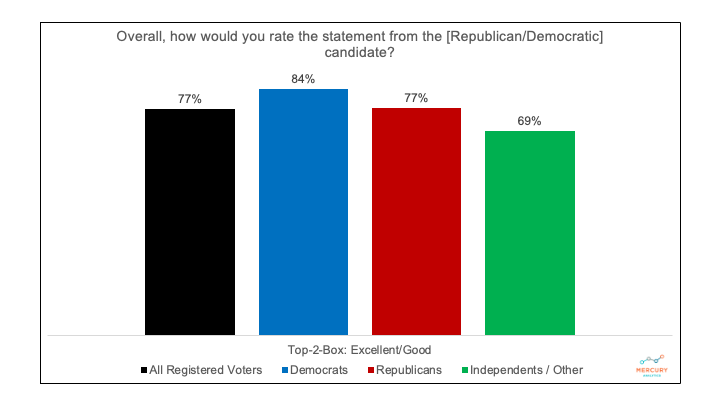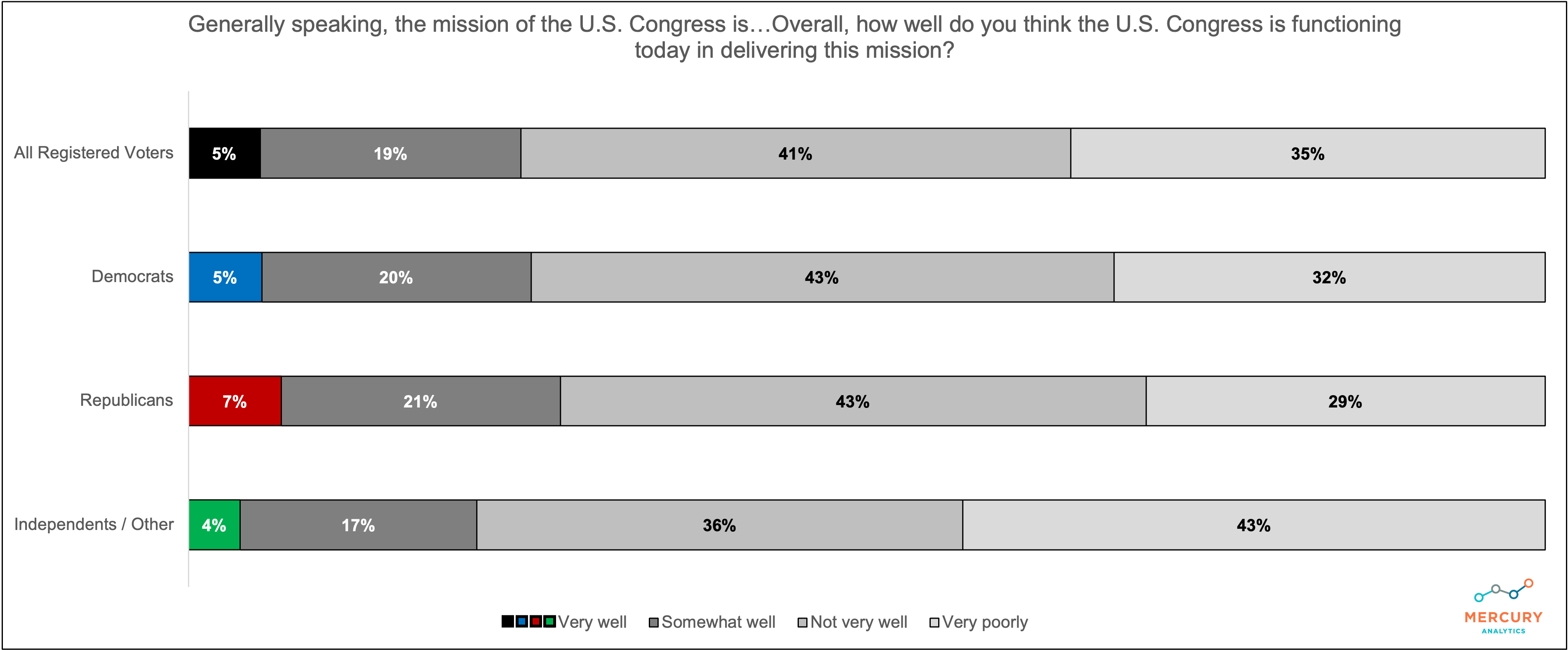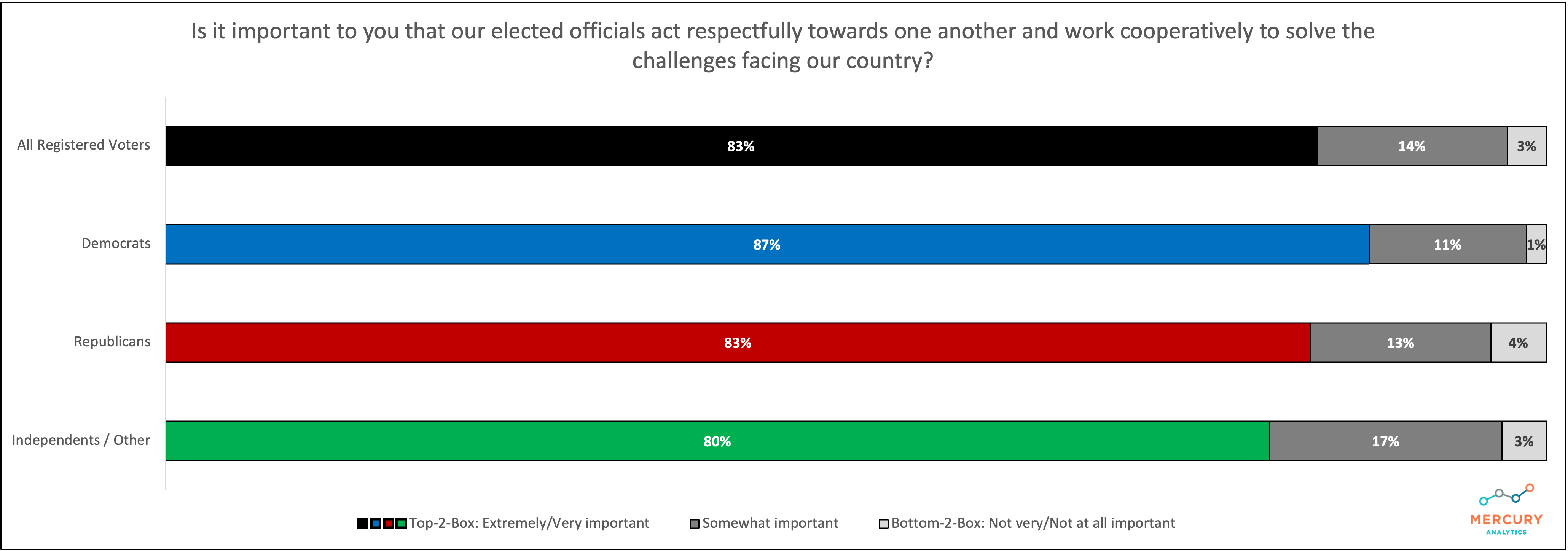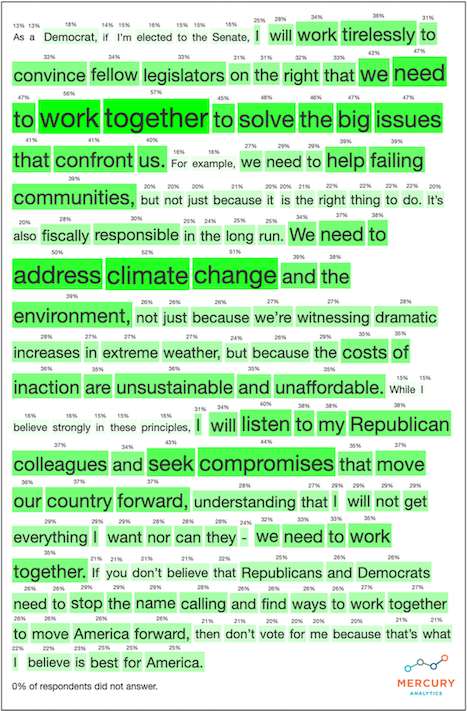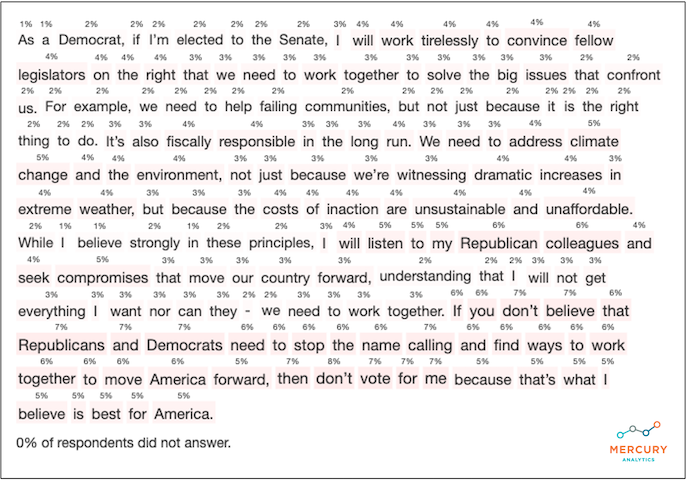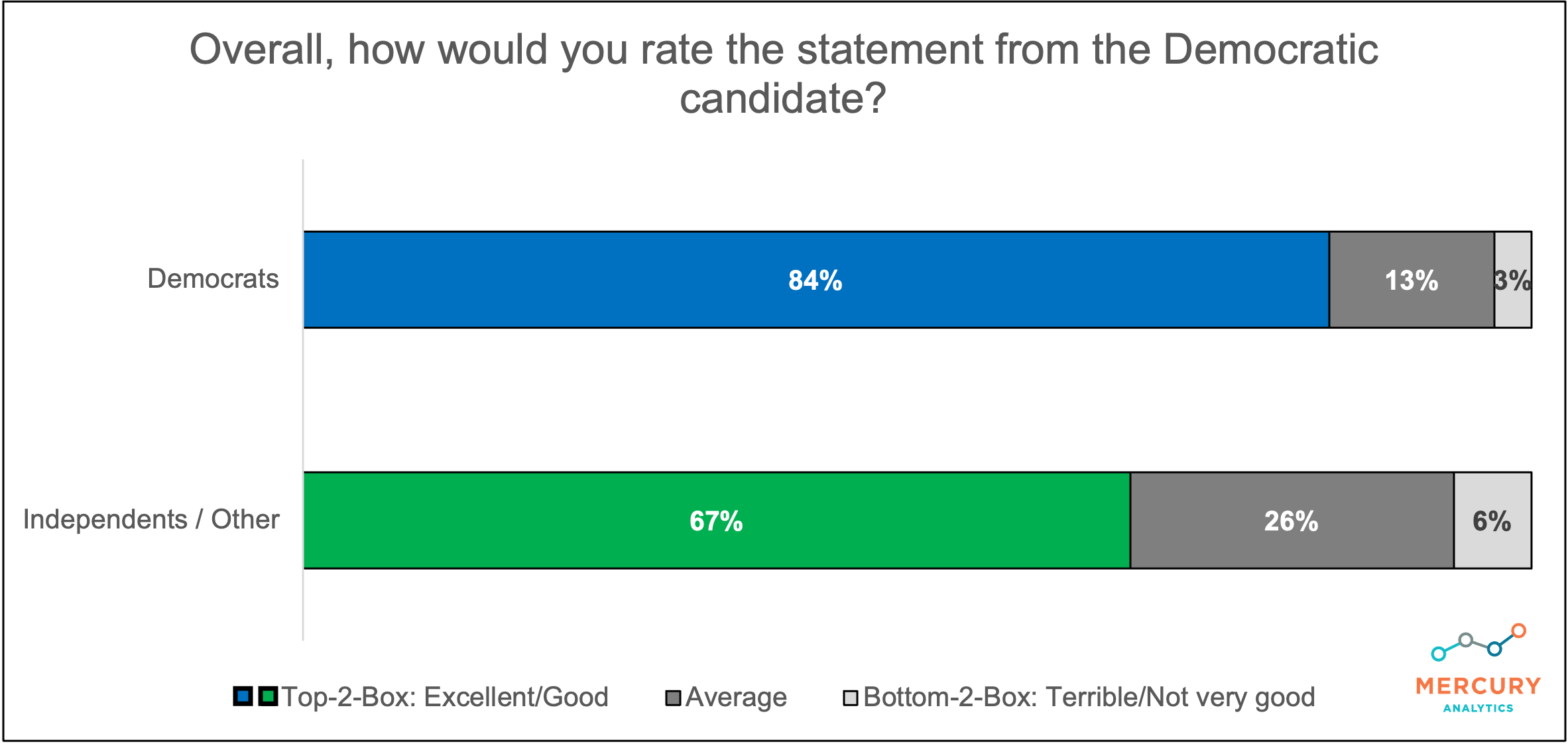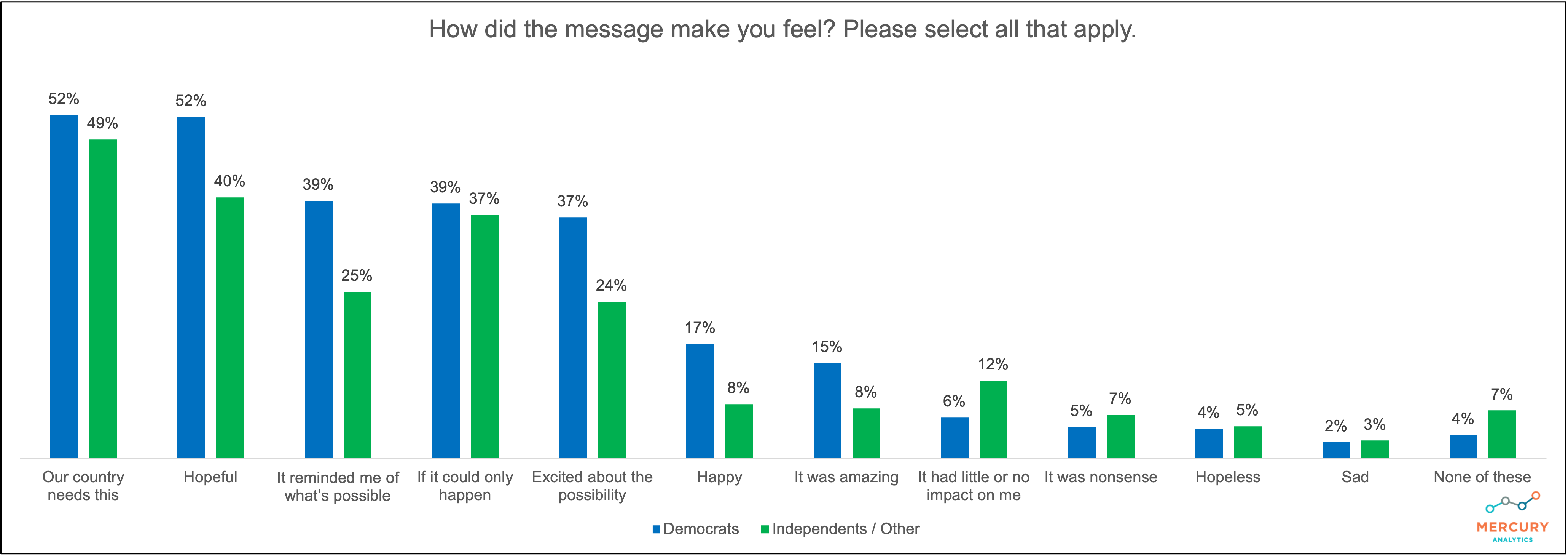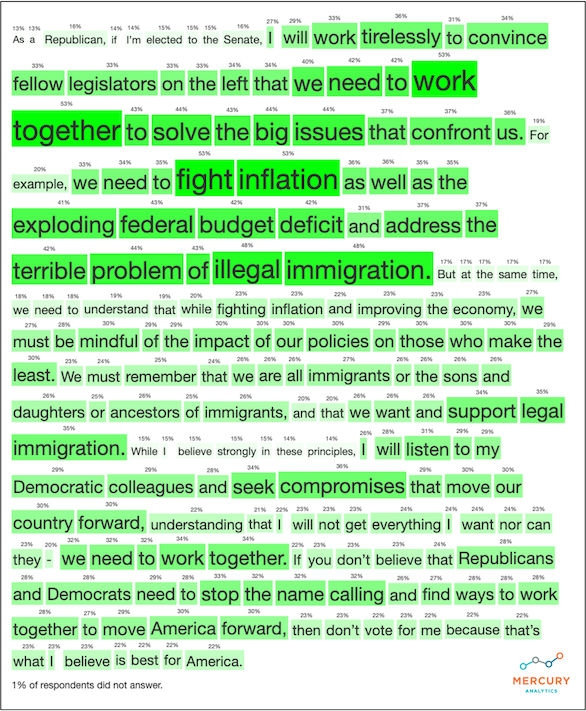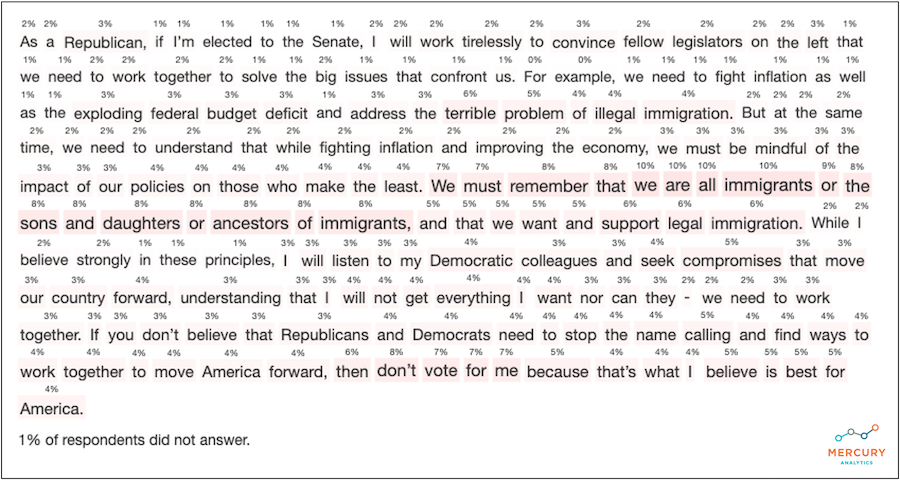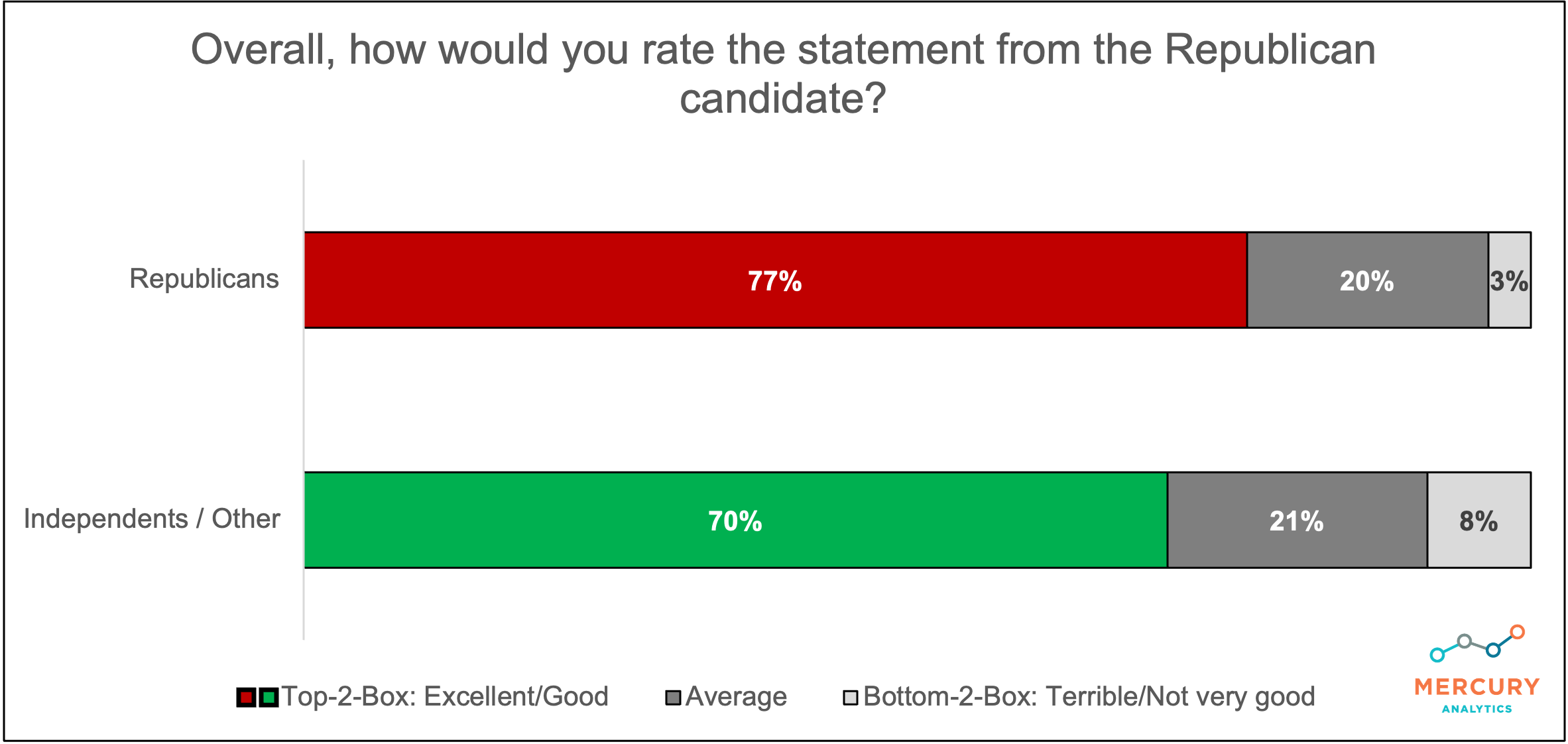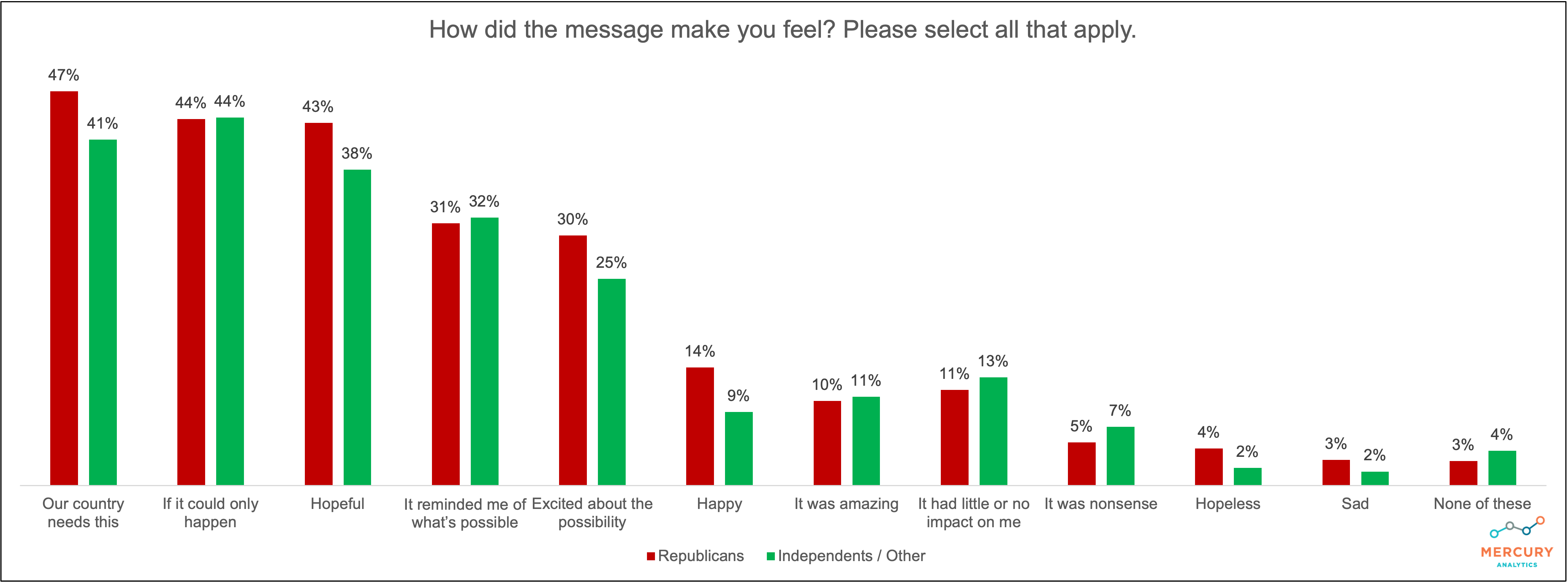United in Exhaustion
New Study Reveals Americans Across the Political Divide are Fed Up with Partisan Warfare
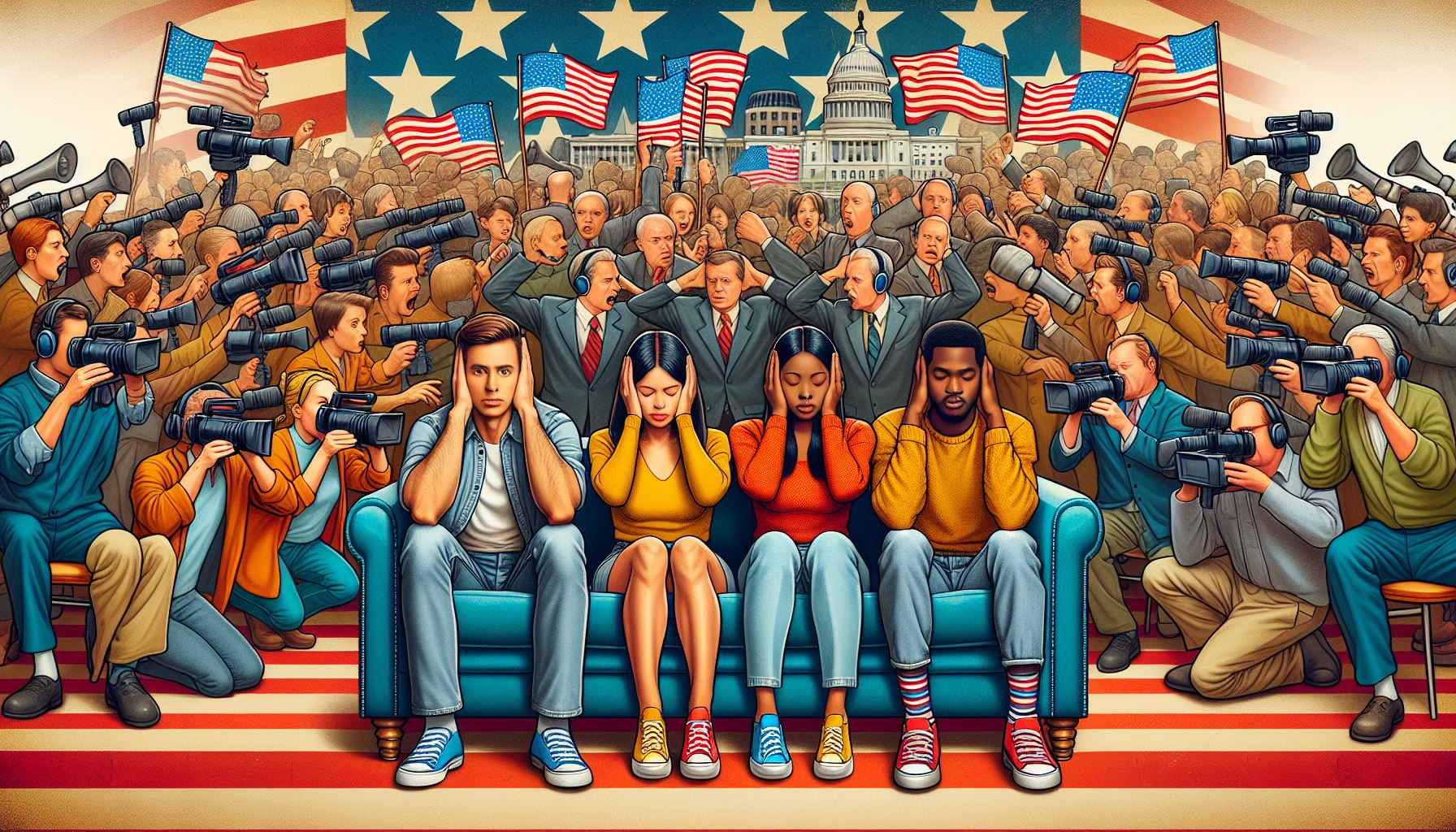
United in Exhaustion:
New Study Reveals Americans Across the Political Divide Are Fed Up With Partisan Warfare
A groundbreaking study conducted by Mercury Analytics has brought to light a surprising consensus among Americans, regardless of political affiliation. Overwhelmingly, a national voter study of n=1,024 participants from the Republican, Democratic, and Independent camps express a deep-seated weariness of the ongoing partisan conflicts that plague the nation’s politics.
Despite the tendency for each side to blame the other for the lack of civility, the research found that an overwhelming majority yearn for bipartisan cooperation. A striking 76% of all participants (Democrats 78%, Republicans 75% and Independent voters 73%), voiced the need for parties to bridge divides and work together, underscoring a national desire for a more harmonious political landscape.
UNITY PLEDGE
The study asked if a candidate pledged to communicate their views on issues without insulting members of the other party, negotiate hard but find compromise even when some issues will be disagreeable, and pledge “I am an American first. I support my party second.”, would you be more or less likely to support them.
Overall:
-
-
- 92% of voters would be “Much more” or “Somewhat more” likely to support them
- 93% of Democrats would be “Much more” or “Somewhat more” likely to support them
- 94% of Republicans would be “Much more” or “Somewhat more” likely to support them
- 87% of Independent voters would be “Much more” or “Somewhat more” likely to support them
-
Fight and/or Compromise
The study also tested a hypothetical campaign message among Republican and Democratic participants.
Each of the two tested messages promised that the candidate would fight for important issues dear to their party but would be willing to compromise in order to move America forward, and each finished by saying “If you don’t believe that Republicans and Democrats need to stop the name calling and find ways to work together to move America forward, then don’t vote for me because that’s what I believe is best for America.”
A total of 77% of all participants found the message “Excellent” or “Good”, including 84% of Democrats, 77% of Republicans, and 69% of Independent voters.
SHIFT TO UNITY AND COOPERATION
The study’s implications are clear: Americans are calling for a shift in political discourse toward respectful dialogue and pragmatic problem-solving. This collective craving for decorum in governance was echoed in their enthusiastic support for candidates pledging to uphold civility and cross-party dialogue, with high agreement across all political spectrums. As America looks ahead to future elections, this preference for unity and cooperation may signal a pivotal moment in the nation’s pursuit of a less divided, more collaborative political future.
KEY SURVEY DATA
CONGESS PERFORMANCE RATING
Only about 1 in 4 registered voters think that the US Congress is functioning well in terms of delivering its mission – and fewer than 1 in 10 think it is functioning “very well”.
- Independents are especially negative about Congress’s performance, with 43% indicating they believe it is functioning “very poorly”.
- Democrats and Republicans grade Congress’s performance similarly.
- As indicated by open-end responses, registered voters believe partisan politics are responsible for Congress’s poor performance.
Why do you think the U.S. Congress is functioning [“very well“/“somewhat well“] well in delivering this mission? (n251)
“I think they are trying and doing their best but Biden has really messed things up.” – Republican
“I think so because the U.S Congress has avoided multiple government shut downs in less than a year and came to a resolution to maintain a working government!” – Democrat
“they are accomplishing the necessary tasks to keep everything going steady and moving in the right direction.” – Independent / Other
Why do you think the U.S. Congress is functioning [“not very well“/“very poorly“] in delivering this mission? (n773)
“Today we have a Congress that seems to have a “my way or the highway” mentality. Some congressmen refuse to listen to each side of a conflict.” – Republican
“I think the incentive structure for politicians is bad now, in that politicians are rewarded more for soundbites and performative outrage, etc, than actually passing legislation.” – Democrat
“They have hardly passed any legislation at all and have instead spent their time investigating each other and fighting in front of cameras while collecting a paycheck.” – Independent / Other
Divisions: Bad or Necessary?
Overall, three-quarters of registered voters want Republicans and Democrats to work together and indicate that their view of the state of politics in America is best described by the statement: “The divisions that exist between Republicans and Democrats are bad for America. I want to see Republicans and Democrats working together again solving our problems.” vs “The divisions and fighting that exist between Republicans and Democrats are necessary to restore American greatness. Compromise between Republicans and Democrats has led to the problems we face.”
- Nearly 6 times the number of Republicans, Democrats and Independents want both parties to work together versus stay divided.
Is Unity Important to Voters?
83% of registered voters overall believe it is “extremely” or “very” important for our elected officials to act respectfully toward one another and work cooperatively to solve the challenges facing our country versus a fraction of the country that feels differently.
- Democrats place the most importance on Unity, with 87% indicating that respect and cooperation from elected officials is “extremely” or “very” important, followed by Republicans (83% “extremely” or “very” important), and then Independents (80% “extremely” or “very” important).
Would Voters Support a Pledge of Unity?
UNITY PLEDGE FOR CANDIDATES FOR CONGRESSIONAL OFFICE
- I will clearly communicate how I feel about an issue without insulting other legislators that I disagree with
- I will negotiate hard for those things I feel strongly about, but work with other legislators who feel differently to find compromises, even if the compromises include some issues that I do not agree with
- I endorse the statement that “I am an American 1ST. I am a [BASED ON PARTY “Republican/Democrat/Independent”] 2nd.”
Participants were shown the unity pledge and asked whether they would be more or less supportive of a candidate who took the pledge. Response to the Unity Pledge, was overwhelmingly positive, with over 90% of registered voters from all parties indicating that they would be “much” or “somewhat” more likely to support a political candidate that signed and endorsed the Unity Pledge.
- Approximately 10% of voters of any party would be “somewhat” or “much” less supportive of a candidate who signed and endorsed the pledge.
DEMOCRATIC CANDIDATE STATEMENT
DEMOCRATIC CANDIDATE STATEMENT: RATING
84% of Democrats rate the statement from the Democratic candidate as “excellent” or “good”. Independent voters, meanwhile, are less impressed with the statement, with 67% indicating they think it is “excellent” or “good”.
- Independents are much more likely than Democrats to think the statement is “average” (27% Independents / Other vs. 13% Democrats).
What are the most important reasons that made you feel that the statement was good? (410)
“It sums up exactly how I feel. I am old enough to remember that most of the great things accomplished by the USA in the past was done because someone reached across the aisle.” – Democrat
“I feel like it was clear what the candidate’s position was and it was clear he was willing and expecting to work with the other side to figure out things.” – Independent / Other
“I feel like they seem like they can explain issues in a way that appeals to both sides, which I think will really help with trying to cooperate” – Democrat
What are the most important reasons that made you feel that the statement was bad? (n19)
“I think that paragraph was just plain old double talk to pacify the Republicans!” – Democrat
“i just dont care about how well they get along” – Independent / Other
“We cannot work together because there is no compromise with a party that does not believe in issues like climate change, women’s rights, etc. we have fundamentally different views that cannot be compromised on.” – Democrat
DEMOCRATIC CANDIDATE STATEMENT: FEELINGS
Respondents who viewed the statement from the Democratic candidate are most likely to indicate they feel that “our country needs this” (52% Democrats, 49% Independents / Other), “hopeful” (52% Democrats, 40% Independents / Other), and feel “if it could only happen” (39% Democrats, 37% Independents / Other) . They are least likely, meanwhile, to indicate they feel “sad” (2% Democrats, 3% Independents / Other) and ”hopeless” (4% Democrats, 5% Independents / Other).
REPUBLICAN CANDIDATE STATEMENT
What are the most important reasons that made you feel that the statement was good? (373)
“That he would put America first above everything else, no matter if he doesn’t get all he wants in a bill.” – Republican
“It acknowledges the candidate’s own beliefs but also acknowledges that s/he may not get everything desired in an effort to move the country forward.” – Independent / Other
“This candidate was able to get his point across without disparaging his opponent. He was easy to understand.” – Republican
What are the most important reasons that made you feel that the statement was bad? (n28)
“He/she used buzz words and spoke out of both sides of their mouth. It was political pablum giving lip service to key issues on one hand but then being willing to cave to the other side not to really address them.” – Republican
“Compromise is not always a good thing and is often worse. After all, you would not want to compromise with a fire to only put half of it out.” – Independent / Other
“Compromise to Dems means that the GOP rolls over to their demands. Something Dems never do.” – Republican
REPUBLICAN CANDIDATE STATEMENT: FEELINGS
Respondents who viewed the statement from the Republican candidate are most likely to indicate they feel that “our country needs this” (47% Republicans, 41% Independents / Other), “if only it could happen” (44% Republicans, 44% Independents / Other), and “hopeful” (43% Republicans, 38% Independents / Other).
They are least likely to indicate they feel “sad” (3% Republicans, 2% Independents / Other) and ”hopeless” (4% Republicans, 2% Independents / Other).
METHODOLOGY
Respondents first answered screener questions to determine eligibility and, once admitted, were asked about their past voting habits and current perceptions of politics in the US, including the existing divisions between parties, and the performance of Congress and behavior of its members.
Respondents were then introduced to the idea of a “Unity Pledge” that would commit a political candidate to clear communication, collaboration, and a willingness to compromise with their counterparts across the aisle. Along with answering a series of questions about feelings towards the pledge, respondents used Mercury’s Text Highlighting tool to indicate the specific words or phrases within the candidate’s statement they either agreed or disagreed with.
Finally, respondents were asked a final set of demographic questions before the conclusion of the survey.
Quotas were set on gender, age, ethnicity, political party, and region, and final data was weighted to ensure a nationally representative sample.
Margin of error, calculated at a 95% confidence level, is +/- 3.06% for this study.
If you would like direct access to the research data, please contact Ana Ryskin (anar @ mercuryanalytics.com) to arrange free access to our Analytics Workbench platform for this project.
let's connect today.
better technology. better insights. better decisions.

1120 20TH ST NW. SUITE 350
WASHINGTON, DC 20036
202.386.6322 EXT 2
Reach out
© 2025 Mercury Analytics, All Rights Reserved | Privacy Policy

